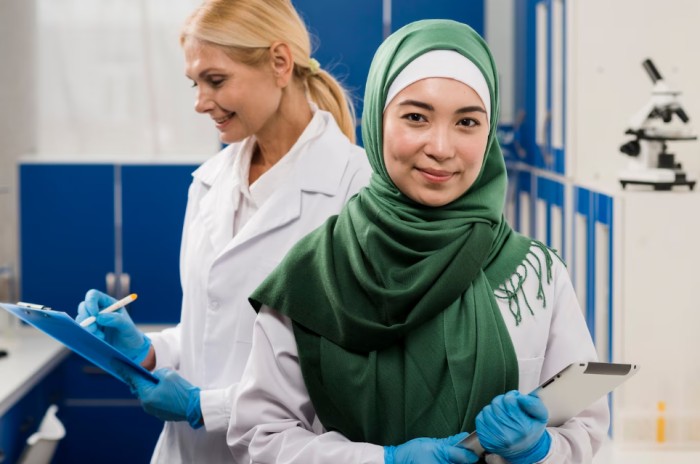IMANA NEWS
Impact of Muslim Physicians on Healthcare
21 August 2023

Medicine has grown and changed a lot over the centuries. Islamic medicine, which is based on the philosophy of divine unity or tawhid, has played a crucial role. Modern medicine as we know it today wouldn’t be possible without the contributions of Muslim physicians.
Holistic healing that combines physical and psychological well-being was first established by Ibn Sina. He is known as the Prince of Physicians and is popularly referred to as Avicenna in the West. His book, Kitab al Shifa, or Book of Healing, was a significant work that combined Islamic theology with Aristotelian and Platonic philosophical traditions. Another literary masterpiece by Sina is The Canon, or Al Qanun fi al Tibb. The manuscript is considered the most influential medical book written by a Muslim physician.
Muslim physicians continue to influence the evolution and development of medicine. Let’s explore their impact to understand their importance in the healthcare sector.
How Cultural Competence and Diversity Enhance Healthcare
Cultural competence ensures that patients from all backgrounds receive the best possible care while feeling respected and understood. American Muslim physicians contribute to cultural competence with their various countries of origin and culture. They have firsthand knowledge of Islamic practices, rituals, and dietary requirements which helps them navigate potential cultural barriers that may hinder effective communication and treatment.
They are thus able to understand and respect the customs, beliefs, and values of not just their Muslim patients, but patients from other communities. This is particularly true as Islamic culture varies across regions, making Muslim physicians particularly well-equipped to handle issues pertaining to cultural and religious differences that can affect healthcare.
With their diverse backgrounds, they are able to foster an inclusive and compassionate healthcare environment where treatment plans can be tailored to abide by the patient’s culture and belief systems whenever possible.
This heightened cultural competence results in improved patient satisfaction, adherence to treatment plans, and better health outcomes. Their unique awareness fosters communication and trust. Patients feel more at ease discussing sensitive issues with doctors who can relate to their backgrounds and belief systems. Fostering an open dialogue helps with accurate diagnoses, effective treatments, and an overall positive experience.
Muslim Unity in Humanitarian Efforts
A vast majority of Muslim physicians believe that it is important for professionals to provide healthcare assistance and expertise to local community organizations. They also maintain that political involvement in health-related issues is crucial as is the active advocacy of medical organizations in promoting public health.
There is thus a prevailing sense of active inclusion in humanitarian efforts from Muslim healthcare professionals. Be it through community service, active participation in civic organizations, or volunteer work, Muslim professionals play a huge role in furthering health and wellness in their societies and communities, both local and international.
Najah Bazzy
Most notably, Registered Nurse Najah Bazzy is an internationally recognized humanitarian and interfaith leader who was selected as the Michigan honoree in USA TODAY’s Women of the Year. As the founder and CEO of Zaman International, she has worked tirelessly to address poverty.
She is also the CEO of Diversity Specialists and as such, champions the implementation of transcultural clinical care. She has provided diversity and transcultural training to the United States Army, the United States Department of Justice, and the International Red Cross and Red Crescent. Her work has impacted over 2.87 million people in 20 countries since 2010.
IMANA
The Islamic Medical Association of North America (IMANA) provides assistance in areas hit by disaster, including emergency and long-term medical relief. Over the last 15 years, IMANA Medical Relief has gained global recognition for its humanitarian and medical relief efforts.
Our large-scale relief efforts began in 2004. In coordination with the United Nations and other organizations, we offered medical relief to survivors of the Indonesian tsunami. We also mobilized major medical relief projects in response to the 2005 Pakistan earthquake as well as the 2010 Haiti earthquake and Pakistan floods.
Islam and Medical Ethics: Guidelines for Muslim Practitioners
Islam has specific medical ethics or ideologies that provide clear guidelines on medical practices. These can be very beneficial for all physicians to learn, particularly Muslim doctors who treat Muslim patients.
These directives encompass a wide array of health-related matters, including:
- Contraception
- Organ donation
- Abortion
- Life support and euthanasia for terminally ill patients
- Death
- Pregnancy
- Fasting
Learning what they entail is extremely helpful in treating Muslim patients. Familiarity will ensure that their beliefs are respected while helping guarantee their comfort and confidence in their physician’s abilities.
Meanwhile, Islamic teachings regarding principles (such as transparency, integrity, diversity, equality, dedication, and respect) can further enhance healthcare professionals’ quality of care.
While science and religion are typically treated as opposing ideologies, Islamic medical teachings show that the two can overlap and be highly beneficial to communities across the world. With teachings on hygiene, stress management, healthy eating, and the overall importance of health, Islam offers health-related guidelines that remain relevant in today’s modern world.
Final Thoughts
Since ancient times, Islamic scholars and physicians have changed the course of medicine. Modern medicine certainly wouldn’t be the same without them. IMANA continues to honor the ties between modern medicine and Islamic medicine, combining the two to treat physical and psychiatric issues.
Our practices align with Ibn Sina’s idea of holistic health as we utilize the best of modern-day medicine and Islamic teachings to foster overall health and wellness.